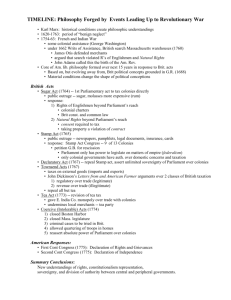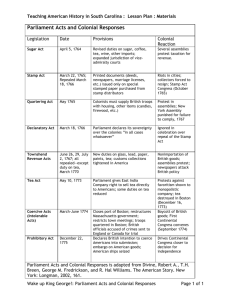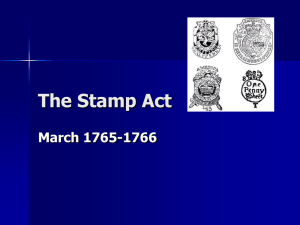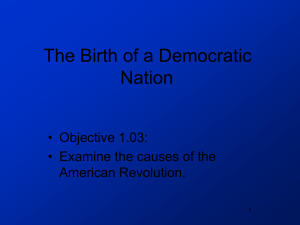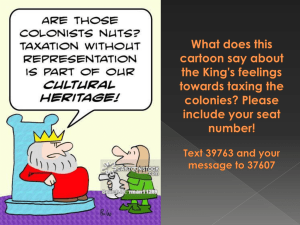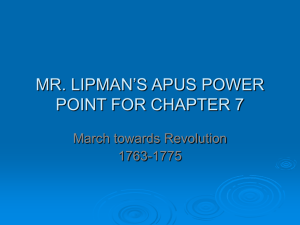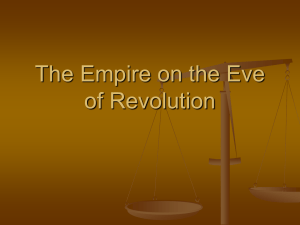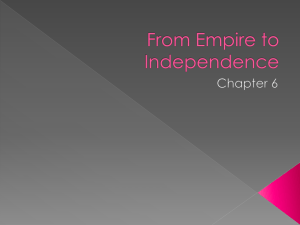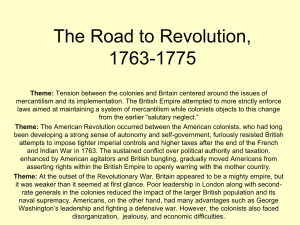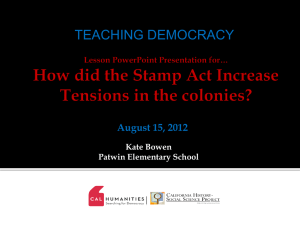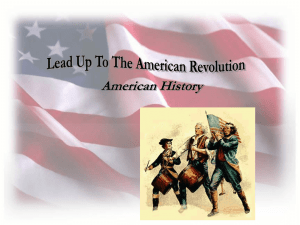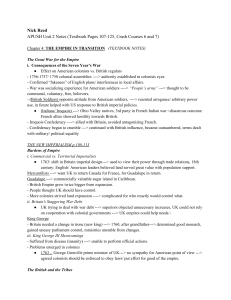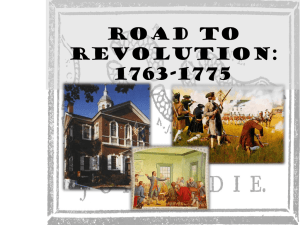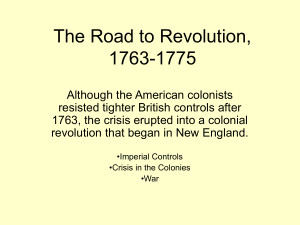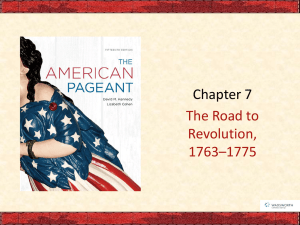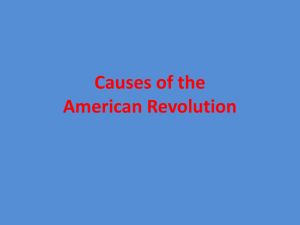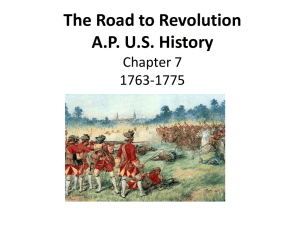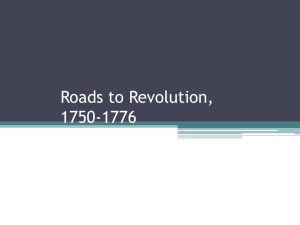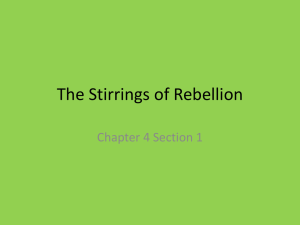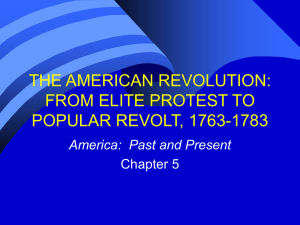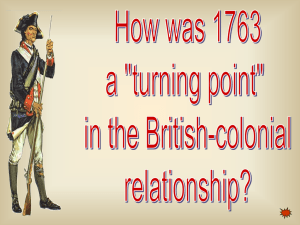Primary Source Evidence
advertisement
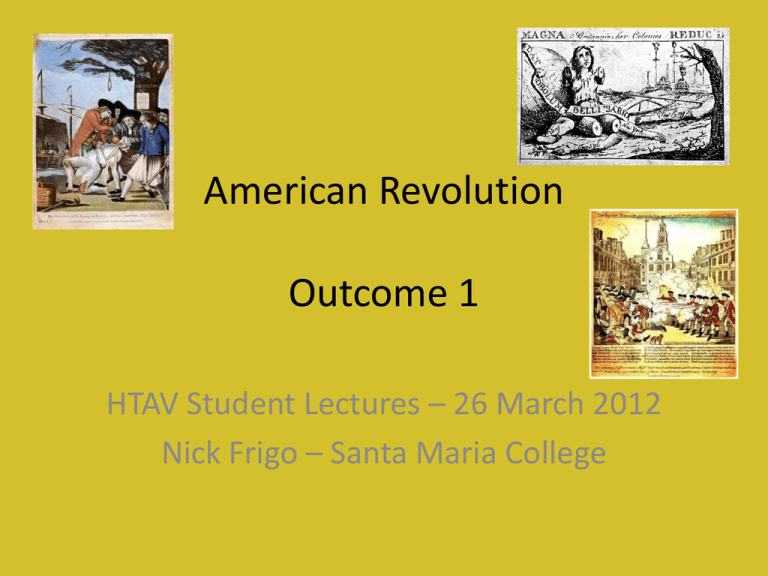
American Revolution Outcome 1 HTAV Student Lectures – 26 March 2012 Nick Frigo – Santa Maria College April 1764 - Sugar Act • Factual Evidence Imposed duties on foreign sugar and and enforced customs duties. • Primary Source Evidence “but duties as high as are laid by this Act, cannot by any means . . . Be collected, being vastly greater than the trade itself can possibly bear . . . “ – Stephen Hopkins, Governor of Rhode Island. • Secondary Source Evidence “The Sugar Act (Grenville’s American revenue Act) was parliaments first law for the specific purpose of raising money in the colonies” • Reason – British Action – Colonial Reaction – British Response . . . March 1765 -Stamp Act Factual Evidence Meant a tax on: legal documents, business contracts, licenses, land deeds, newspapers, journal and playing cards. • Primary Source Evidence How can it be reconciled that the “colonies, who are without one representative in the House of Commons, should be taxed by the British Parliament.” – James Otis, “The Rights of the British Colonists asserted and Proved”, July 1764 • Secondary Source Evidence “Through this Act, the British were taxing the colonial population to pay for the French war, in which colonists had suffered to expand the British Empire.” – Howard Zinn, A People’s History of the US., p. 61. ** Reason – British Action – Colonial Reaction – British Response . . . The Stamp Act Congress • Gordon Wood claimed that while the formation of Stamp Act Congress was an “unprecedented display of colonial unity . . . With its opening acknowledgement of ‘all due subordination to that August Body the Parliament of Great Britain’, could not fully express American hostility.” – Gordon Wood, The American Revolution. • The Stamp Act Congress declarations defined the American position at the outset of the controversy, and despite subsequent confusion and stumbling, the colonists never abandoned this essential point. • The Declarations of the Stamp Act Congress, 1765 Repeal of the Stamp Act • News of the repeal took 2 months to reach America. When it did, John Adams recalled, it “hushed into silence almost every popular Clamour, and composed every Wave of Popular Disorder into a smooth and peaceful Calm”. • “If ‘internal’ taxes, like the stamp tax were objectionable to Americans, the authority of Parliament to levy ‘external’ taxes – duties on imported goods – was not.” – Howard Zinn. • The repeal of the Stamp Act did nothing for the Empire’s budget so . . . Declaratory Act • Following the repeal of the Stamp Act, the Rockingham Ministry consented to the adoption of the Declaratory Act, “baldly stating that Parliament retained the power to legislate for the colonies ‘in all cases whatsoever’.” - Jack Rakove, Revolutionaries. • British parliament did not want to look like they were giving in to the colonists. • Parliament yielded to colonist protests, but WAS NOT prepared to exempt colonists from the highest power of the British Empire. The Townshend Duties – Revenue Acts • Factual Evidence Taxed items that had to be imported: paint, tea, glass, paper - Colonists responded by attempted to lessen the use of such items (boycott). • Primary Source Evidence Contemporary Letter: “Another Act of Parliament which appears to me to be unconstitutional and as destructive to liberty of these colonies.” – Letters from a Farmer • Secondary Source Evidence • Reason – British Action – Colonial Reaction – British Response . . . Townshend Acts • Townshend “clearly conceived his scheme as a way of habituating Americans to the payment of new taxes. He also hoped to exploit Franklin’s distinction between internal and external taxes, the former objectionable on constitutional grounds, the latter presumably acceptable under Parliament’s general authority over trade.” – Jack Rakove, Revolutionaries. John Dickinson, Letters from a farmer in Pennsylvania • For Dickinson “a ‘tax was a tax’. Whatever its form, Parliament had no right to levy on the colonies . . . ‘Parliament … possesses a legal authority to regulate the trade of Great Britain, and all her colonies’, but it had no right to tax the colonies in any way”. – Edward Countryman, The American Revolution. Further colonial responses… • Dickinson’s ideas were not fully matched by the colonist’s action . . . • In 1765 the Stamp Act Congress had helped establish a framework for intercontinental unity. • In reality, the push for boycotts came from individual colonial assemblies . . . • “Shops selling British goods were smeared with the mixture of mud and faeces called ‘Hillsborough paint’ to mock the British minister for colonial affairs.” – Jack Rakove, Revolutionaries. The Boston Massacre • On 5 March “a crowd gathered in King Street to confront troops who were guarding the customs house. Someone began to throw snowballs, and the soldiers panicked. Someone else – his name has never been established – shouted the order to fire, and a minute later five Bostonians lay dying. Many more were wounded.” – Edward Countryman, The American Revolution. “The ‘Boston Massacre’, especially as it was depicted in Paul Revere’s exaggerated engraving, aroused American passions and inspired some of the most sensational rhetoric heard in the Revolutionary era.” – Gordon S. Wood, The American Revolution. 1770 • The historian, political philosopher and author Edmund Burke wrote the following in 1770: • “The Americans . . . Have made a discovery, or think they have made one, that we mean to oppress them. We have made a discovery, or think we have made one, that they intend to rise in rebellion against us . . . we know not how to advance, they know not how to retreat . . . Some party must give way.” Boston Tea Party . . . What historians had to say . . . • “The Tea Party led to the Coercive Acts by Parliament, virtually establishing martial law in Massachusetts, dissolving the colonial government, closing the port in Boston and sending in troops. Still, town meetings and mass meetings rose in opposition.” – Howard Zinn, A People’s History of the United States, p. 67. Boston Tea Party and its legacy . . . What historians had to say . . . • “The Boston Tea Party galvanized support for the movement toward independence not only in the colonies, but among liberal elements in Britain as well.” – Alan Axelrod, The Real History of the American Revolution, p. 68. • “The Coercive Acts were the last straw. They convinced Americans once and for all that Parliament had no more right to make laws for them than to tax them.” – Gordon Wood, American Revolution, p. 37. What Colonials had to say about the Boston Tea Party • John Adams – “This is the most magnificent movement of all . . . This destruction of the tea is so bold, so daring, so firm, so intrepid, and inflexible, and it must have so important consequences, and so lasting, that I can’t but consider it an epoch in history.” – cited in Gordon Wood, American Revolution, pp 36-7.

